How Adaptogens Can Help Manage Stress-Related Mood Disorders
Introduction
In today’s fast-paced world, many of us live in a near-constant state of stress. Deadlines, emotional strain, sleep deprivation, and digital overload can all wear down the body’s natural ability to adapt. Over time, this chronic stress can lead to mood disorders — including anxiety, irritability, and depression.
But nature offers a fascinating category of herbs known as adaptogens — substances that help the body “adapt” to stress, restore balance, and regulate mood. Used for centuries in Ayurvedic and Chinese medicine, adaptogens are now being studied by modern science for their ability to stabilize the stress response system, balance hormones, and even support brain chemistry.
In this article, we’ll explore how adaptogens work, which ones are most effective for stress-related mood disorders, and how you can safely integrate them into your daily wellness routine 🌱
Looking for supplements for Brain Fog? Click here.
🧠 What Are Adaptogens?
Adaptogens are a unique class of natural herbs and compounds that help your body resist physical, chemical, or emotional stress.
🌱 Definition
The term “adaptogen” was first coined in 1947 by Russian scientist Dr. Nikolai Lazarev. To qualify as an adaptogen, a plant must:
- Help the body adapt to stress.
- Restore normal physiological function (homeostasis).
- Be safe and non-toxic even with long-term use.
Think of adaptogens as smart herbs — they modulate the body’s stress response rather than simply stimulating or sedating it.
⚙️ The Stress Response and Mood Disorders
To understand how adaptogens work, we need to look at what happens in the body under chronic stress.
When you’re exposed to a stressor (like work pressure or emotional trauma), your body activates the HPA axis — the hypothalamic-pituitary-adrenal system — which releases cortisol, the main stress hormone.
Short-term cortisol is helpful (it keeps you alert), but chronic high cortisol can lead to:
Fatigue 😩
Anxiety 😰
Irritability or mood swings 😠
Depression 😔
Sleep disturbances 🌙
Weakened immune system 🦠
Adaptogens help regulate this axis — reducing excess cortisol when it’s high and supporting it when it’s low, promoting balanced energy and emotional stability.
🌿 How Adaptogens Help with Stress-Related Mood Disorders

Adaptogens don’t just make you feel relaxed — they actually retrain your body to respond more calmly to stress.
🧬 Mechanisms of Action
Regulation of Cortisol:
Adaptogens modulate the adrenal glands, helping to prevent spikes and crashes of stress hormones.
Balancing Neurotransmitters:
They influence serotonin, dopamine, and GABA — the brain chemicals that affect mood and motivation.
Reducing Inflammation:
Chronic stress causes inflammation in the brain, which contributes to depression and anxiety. Adaptogens possess strong anti-inflammatory properties.
Supporting Mitochondrial Energy:
Adaptogens enhance energy production at the cellular level, reducing fatigue and burnout.
Improving Neuroplasticity:
Some adaptogens increase BDNF (Brain-Derived Neurotrophic Factor), supporting neuronal growth and emotional resilience.
💡 In short, adaptogens don’t just mask stress — they teach your body to handle it better.
🌸 Top Adaptogens for Stress-Related Mood Disorders
Below are the best-studied and most effective adaptogens for emotional balance, resilience, and mood stability.
🌿 Ashwagandha (Withania somnifera)
Ashwagandha is one of the most popular adaptogens in Ayurveda, often called the “king of herbs.”
🌼 Key Benefits
Lowers cortisol levels
Reduces anxiety and nervous tension
Improves sleep quality
Enhances resilience to daily stress
Supports thyroid and hormone balance
🔬 Research Spotlight
A 2019 study published in Medicine (Baltimore) showed that 240 mg of ashwagandha extract daily significantly reduced stress, anxiety, and serum cortisol levels in adults with chronic stress.
🧘 How It Helps Mood Disorders
Ashwagandha’s calming effect supports GABA activity and helps reduce overactivity in the HPA axis — ideal for stress-induced anxiety and mild depression.
💊 Dosage
300–600 mg of standardized extract (KSM-66 or Sensoril) daily.
🌺 Rhodiola Rosea
Known as the “golden root,” Rhodiola has been used in Scandinavian and Siberian medicine for centuries to increase endurance and resilience.
🌼 Key Benefits
Fights fatigue and burnout
Enhances focus and motivation
Improves mild to moderate depression
Reduces emotional exhaustion
🔬 Research Spotlight
A Phytomedicine (2009) study found Rhodiola to be as effective as sertraline (Zoloft) for mild depression — but with fewer side effects.
🧘 How It Helps Mood Disorders
Rhodiola supports serotonin and dopamine balance, especially in people who experience emotional flatness or fatigue-related depression.
💊 Dosage
200–400 mg of standardized extract (3% rosavins, 1% salidroside) per day.
⚠️ Avoid taking it at night — it can be mildly stimulating.
🍄 Reishi Mushroom (Ganoderma lucidum)
Reishi, often called the “mushroom of immortality,” is a gentle adaptogen that promotes calmness and overall balance.
🌼 Key Benefits
Reduces anxiety and emotional restlessness
Supports immunity
Promotes deep sleep
Lowers stress-induced inflammation
🔬 Research Spotlight
Studies show Reishi modulates inflammatory pathways and reduces fatigue in people with chronic stress, improving mood and overall well-being.
💊 Dosage
1,000–2,000 mg of Reishi extract daily (preferably before bedtime).
🧘 Best for: Those with anxiety, restlessness, or poor sleep quality.
🌻 Holy Basil (Tulsi)
Holy Basil is a sacred herb in India, known as the “elixir of life.” It balances mood, hormones, and energy.
🌼 Key Benefits
Reduces cortisol and stress hormones
Improves mental clarity
Eases anxiety and mild depression
Regulates blood sugar and mood stability
🔬 Research Spotlight
A 2016 clinical trial found Tulsi extract reduced anxiety and improved social functioning and sleep quality in participants experiencing chronic stress.
💊 Dosage
300–500 mg of leaf extract daily, or as tea (1–2 cups per day).
🌿 Perfect for: Emotional instability due to hormonal or blood sugar swings.
🌺 Schisandra Chinensis
A berry used in Traditional Chinese Medicine, Schisandra supports liver detoxification and boosts physical and mental endurance.
🌼 Key Benefits
Improves concentration and endurance
Enhances mood and mental clarity
Supports the body’s stress response
Reduces fatigue
🔬 Research Spotlight
A Journal of Ethnopharmacology study showed Schisandra helps regulate neurotransmitters like dopamine and serotonin, improving mental performance under stress.
💊 Dosage
500–1000 mg of extract daily.
⚙️ Best for: Those who feel mentally drained but need motivation and focus.
🌿 Eleuthero (Siberian Ginseng)
Eleuthero, one of the original adaptogens studied by Soviet scientists, helps improve endurance and recovery under stress.
🌼 Key Benefits
Reduces fatigue and improves energy
Enhances cognitive function
Improves resilience to stress
Supports adrenal health
🔬 Research Spotlight
Clinical studies show Eleuthero increases stress tolerance and reduces feelings of burnout in high-pressure workers and athletes.
💊 Dosage
300–1200 mg/day of standardized extract.
🌾 Licorice Root (Glycyrrhiza glabra)
Licorice root supports adrenal function and prolongs the half-life of cortisol in people with low adrenal output.
🌼 Key Benefits
Stabilizes mood
Reduces fatigue and brain fog
Supports cortisol regulation
⚠️ Caution
Avoid high doses if you have high blood pressure or kidney issues.
💊 Dose: 100–300 mg extract daily (or as directed by a professional).
Looking for supplements for Brain Fog? Click here.
🧘 Synergy: Combining Adaptogens for Emotional Balance
Adaptogens often work better together than alone — creating a synergistic effect that supports multiple systems.
🌤️ Calm & Centered Stack (for anxiety + stress)
Ashwagandha (300 mg)
Holy Basil (300 mg)
Reishi Mushroom (1000 mg)
⚡ Energized & Uplifted Stack (for fatigue + low mood)
Rhodiola Rosea (300 mg)
Schisandra (500 mg)
Eleuthero (400 mg)
🌙 Rest & Recovery Stack (for burnout + insomnia)
Ashwagandha (500 mg, evening)
Reishi (1500 mg, bedtime)
Magnesium Glycinate (200 mg)
💬 Tip: Cycle your adaptogens every few weeks to keep your system responsive.
🌬️ Breathwork and Nervous System Support

While adaptogens calm your body biochemically, breathwork supports emotional and nervous system regulation from the inside out.
🌫️ Try This “Reset” Technique:
Inhale through your nose for 4 seconds.
Hold for 2 seconds.
Exhale slowly through your mouth for 6 seconds.
Repeat for 3–5 minutes.
This activates your vagus nerve, shifting you from “fight or flight” to “rest and digest.”
Pairing breathwork with adaptogens amplifies their benefits — balancing both the chemistry and the rhythm of your stress response.
Want to try Breathwork? Click Here.
💬 Therapy and Emotional Regulation
Adaptogens can reduce the biological burden of stress — but emotional healing often requires mental tools too.
Therapies such as:
CBT (Cognitive Behavioral Therapy): For reframing negative thought loops.
DBT (Dialectical Behavior Therapy): For emotion regulation.
Mindfulness and meditation: For present-moment awareness.
Somatic therapies: For releasing stress stored in the body.
When combined with adaptogens, these help retrain the nervous system to respond calmly, not reactively.
🧘 Mind + body alignment = true emotional stability.
Looking for online therapy ? Click Here.
🍽️ Supporting Adaptogen Benefits Through Lifestyle
Adaptogens work best when integrated into a holistic, anti-stress lifestyle.
🌞 Morning
Practice sunlight exposure within 30 minutes of waking.
Take Rhodiola or Eleuthero with breakfast.
Stretch or walk for 10 minutes.
🌿 Afternoon
Eat balanced meals with protein and fiber to stabilize blood sugar.
Use Tulsi tea or Ashwagandha capsules during stressful moments.
🌙 Evening
Limit screens 1 hour before bed.
Take Reishi or Magnesium before sleep.
Practice gentle breathwork or meditation.
💡 Consistency > intensity. The goal isn’t perfection — it’s resilience.
⚠️ Safety and Precautions
Adaptogens are generally safe, but it’s important to use them wisely:
Always buy standardized extracts from reputable brands.
Avoid combining multiple stimulating adaptogens (like Rhodiola and Eleuthero) late in the day.
If pregnant, breastfeeding, or on medication, consult your healthcare provider first.
People with thyroid disorders should be cautious with Ashwagandha.
🌿 Less is more: Start with one adaptogen, then build a combination once you understand how your body responds.
🧩 The Science Behind Adaptogens and Mood
Recent studies confirm that adaptogens can influence both brain chemistry and hormonal balance:
Ashwagandha – Lowers cortisol up to 30% and improves resistance to stress (Chandrasekhar et al., Indian Journal of Psychological Medicine, 2012).
Rhodiola – Increases serotonin and dopamine in key brain regions (Panossian et al., Phytomedicine, 2010).
Reishi – Reduces anxiety and fatigue in people with chronic illness (Wachtel-Galor et al., Herbal Medicine: Biomolecular and Clinical Aspects, 2011).
Tulsi – Modulates cortisol and reduces perceived stress levels (Journal of Ayurveda and Integrative Medicine, 2016).
These herbs appear to normalize the HPA axis, which is overactive in depression and anxiety, while also improving mitochondrial energy production and neuroprotection.
🧠 The result: steadier mood, more clarity, and resilience against emotional overwhelm.
🌈 Real-World Transformation: From Stress to Stability
Imagine waking up feeling more balanced — no racing heart, no panic about the day ahead. Instead of reacting to stress, you respond to it with calm energy.
That’s what adaptogens help cultivate: physiological resilience.
Your nervous system stops swinging between overdrive and burnout; it finds its rhythm again.
🌿 Adaptogens help you:
Stay grounded under pressure
Think clearly when overwhelmed
Feel emotionally stable
Recover faster from stressful events
It’s not instant — but over time, it feels like your mind and body are finally on the same team.
✨ The Mind-Body Connection: A Holistic View
Stress-related mood disorders aren’t just psychological — they’re biological too. Chronic stress changes your brain’s wiring, immune system, and hormone patterns. Adaptogens bridge that gap by addressing both sides:
Mind: Better focus, emotional stability, resilience.
Body: Balanced cortisol, improved immunity, restored vitality.
Paired with supportive therapy, sleep hygiene, and nutrition, adaptogens act as a biological buffer against modern life’s constant demands.
🌞 Sample Daily Routine for Adaptogenic Balance
| Time | Routine | Adaptogens |
|---|---|---|
| 🌅 Morning | Sunlight, hydration, light stretching | Rhodiola (300 mg) |
| ☀️ Midday | Balanced meal with protein and healthy fats | Holy Basil (tea or capsule) |
| 🌿 Afternoon | 5-min breathwork or short walk | Schisandra (500 mg) |
| 🌙 Evening | Calm environment, journaling | Ashwagandha (500 mg) + Reishi (1000 mg) |
Consistency is key. Think of adaptogens not as “quick fixes” but as long-term allies for nervous system health.
🪷 The Future of Adaptogen Research
Modern science is just beginning to understand the complex biochemistry behind adaptogens. Researchers are exploring:
Neuroprotective effects: How they shield the brain from stress-induced damage.
Epigenetic modulation: How adaptogens may influence gene expression linked to stress resilience.
Gut-brain axis: The connection between adaptogens, microbiota, and emotional regulation.
It’s an exciting frontier — bridging traditional medicine and neuroscience in the service of mental well-being.
💬 Key Takeaways
✅ Adaptogens help your body adapt to stress naturally.
✅ They regulate cortisol and support neurotransmitter balance.
✅ They reduce inflammation linked to depression and anxiety.
✅ The best ones for mood support include Ashwagandha, Rhodiola, Reishi, and Holy Basil.
✅ Combined with breathwork, therapy, and lifestyle habits, adaptogens can transform emotional reactivity into grounded resilience.
🌿 You don’t need to fight stress — you can learn to flow with it. And adaptogens are nature’s way of showing you how.
📚 References
Chandrasekhar, K., et al. (2012). “A prospective, randomized double-blind study of Ashwagandha root extract for stress reduction.” Indian Journal of Psychological Medicine, 34(3), 255–262.
Panossian, A., et al. (2010). “Adaptogens in mental and behavioral disorders.” Phytomedicine, 17(6), 481–493.
Wachtel-Galor, S., & Benzie, I. F. (2011). “Ganoderma lucidum (Lingzhi or Reishi).” In Herbal Medicine: Biomolecular and Clinical Aspects.
Ng, Q. X., et al. (2018). “A systematic review and meta-analysis of Rhodiola rosea in depression and fatigue.” Phytotherapy Research, 32(6), 1001–1012.
Cohen, M. M. (2016). “Tulsi – Ocimum sanctum: A herb for all reasons.” Journal of Ayurveda and Integrative Medicine, 7(3), 171–180.
Panossian, A., & Wikman, G. (2009). “Evidence-based efficacy of adaptogens in fatigue, stress, and cognition.” Phytotherapy Research, 23(6), 763–783.
Lopresti, A. L. (2020). “The psychobiology of adaptogens: Emerging therapeutic potential for stress, anxiety, and depression.” Current Neuropharmacology, 18(12), 1086–1110.
Related Posts
-

Nootropics That Promote Calm and Rest
Explore the world of calming nootropics — natural brain enhancers that promote relaxation, better focus, and deeper rest. Learn how L-Theanine, magnesium, ashwagandha, and other adaptogens help balance your nervous system, reduce stress, and support restorative sleep.
-

Best Natural Supplement Stack for Sleep
Discover the best natural supplement stack for deep, restorative sleep. Learn how nutrients like magnesium, L-theanine, glycine, and calming herbs such as chamomile and ashwagandha work together to relax your body, calm your mind, and improve sleep quality—naturally and safely.
-

Combining L-Theanine and Magnesium for Sleep: A Calm Night, Naturally
Discover how combining L-Theanine and Magnesium can help you drift into deep, restorative sleep. Learn how this natural duo calms the mind, relaxes the body, and supports your nervous system—without grogginess the next morning.
-

How to Sleep Better After Intense Workouts
Struggling to fall asleep after a tough workout? Learn how to optimize your post-training recovery with nutrition, hydration, and science-backed sleep strategies. Discover how to calm your nervous system, balance hormones, and wake up fully recharged for your next session.
-

Ashwagandha and Valerian: A Bedtime Combo for Deep Rest and Emotional Reset
Discover the calming synergy of Ashwagandha and Valerian root, two natural sleep aids that help quiet the mind, ease anxiety, and promote deeper rest. Learn how this herbal duo supports the nervous system, balances stress hormones, and restores emotional peace — without next-day grogginess.
-

How to Create a Resilience-Boosting Diet
Discover how to build emotional and physical strength from the inside out with a resilience-boosting diet 🍎. Learn which foods stabilize your mood, how supplements like magnesium and omega-3s strengthen your stress response, and why pairing nutrition with breathwork and therapy creates lasting calm, focus, and vitality 🌿💪.
-

Best Teas and Herbal Blends for Calmness: Nature’s Way to Restore Inner Peace
Ashwagandha, the ancient adaptogenic herb, helps your body find balance during stress. Known as “Indian ginseng,” it supports cortisol regulation, boosts energy, and restores calm clarity. Discover how this powerful root promotes resilience, emotional balance, and steady vitality — one cup at a time. 🌸
-

Parenting and Emotional Strength: How to Raise Children Without Losing Yourself
Empathy is the bridge that connects hearts — the quiet power to understand, feel, and support another’s emotions without judgment. Learn how empathy strengthens relationships, enhances communication, and cultivates deeper compassion in everyday life. 🌿
-

How to Bounce Back from Public Failure: Reclaiming Confidence, Purpose, and Power
Visualization is more than imagination — it’s brain training for resilience. By picturing calm, success, or healing, you activate the same neural pathways as real experience. Learn how daily visualization rewires your brain for confidence, emotional balance, and recovery from stress. ✨
-

Coping with Financial Stress Through Resilience: How to Stay Grounded When Money Feels Tight
Body awareness is the foundation of emotional resilience. By tuning into your body’s signals — tension, fatigue, or calm — you learn to recognize stress before it overwhelms you. Discover how mindfulness, gentle movement, and breathwork can deepen your connection with your body and restore balance from the inside out. 🧘
-

How to Stay Positive During Chronic Illness: A Guide to Emotional Strength and Hope
Creativity is more than art — it’s a form of healing. Whether through painting, writing, music, or small acts of expression, creativity helps release emotion, calm the nervous system, and reconnect you to joy. Discover how to use creativity as a tool for emotional balance, resilience, and self-discovery. 🌿
-

Resilience Tips for Caregivers: How to Stay Strong While Caring for Others
Joy isn’t the absence of pain — it’s the quiet strength to find light even in challenging times. Cultivating joy through small daily moments restores balance, releases stress, and reminds you of life’s beauty. Learn how to reconnect with authentic happiness, rebuild emotional energy, and nurture your nervous system through gratitude, presence, and play. 🌿
-

Building Resilience After a Breakup: How to Heal, Rebuild, and Rise Stronger
Social connection is one of the strongest predictors of emotional resilience. During difficult times, genuine relationships act as anchors — calming the nervous system, reducing stress hormones, and helping you regain perspective. Learn how cultivating real human connection can strengthen your mind, heart, and overall well-being. 🌿
-

How to Stay Emotionally Strong During Job Loss
Your emotions are powered by brain chemistry — a delicate balance of neurotransmitters like serotonin, dopamine, and cortisol. When these chemicals work in harmony, you feel calm, focused, and resilient. Learn how daily habits, nutrition, and mindfulness can support your brain chemistry and boost emotional well-being naturally. 🌿
-

The Role of Hormones in Emotional Stability: How Your Chemistry Shapes Your Calm
Hormones shape more than your body — they shape your emotions, resilience, and sense of calm. From cortisol to serotonin, these chemical messengers influence how you react to stress, connect with others, and recover from challenges. Learn how to balance your hormones naturally to build lasting emotional stability and harmony within. 💫
-

Mitochondria and Emotional Energy: The Cellular Power Behind Your Mood
Breathwork is one of the most powerful tools for emotional regulation and cellular balance. Through intentional breathing, you can calm your nervous system, increase oxygen flow to the brain, and even support mitochondrial energy. Learn how conscious breathing connects body and mind — transforming stress into presence and emotional strength. 🌿
-

Inflammation and Its Impact on Mood Resilience: The Silent Link Between Body and Mind
Inflammation doesn’t just affect the body — it impacts the mind. Chronic inflammation alters brain chemistry, depletes serotonin, and makes emotional recovery harder. Learn how calming inflammation through nutrition, mindfulness, and sleep can restore balance, resilience, and a renewed sense of emotional strength. 💫
-

How Antioxidants Protect Emotional Well-being: The Hidden Link Between Oxidative Stress and Mental Health
Antioxidants do more than protect your body — they defend your mind. By neutralizing oxidative stress, antioxidants support serotonin, dopamine, and brain energy pathways that keep you calm, focused, and emotionally balanced. Discover how foods like berries, green tea, and dark chocolate nourish your brain, boost mood, and strengthen resilience from the inside out. 🌿✨
-

The HPA Axis and Emotional Health: The Hidden Bridge Between Stress and Mind
Neuroplasticity — the brain’s ability to rewire and adapt — is the foundation of emotional healing and resilience. When you face stress, trauma, or change, your neural pathways can reshape themselves to support new patterns of calm, focus, and self-awareness. Learn how daily practices like mindfulness, therapy, and breathwork strengthen neuroplasticity to transform emotional pain into personal growth. 🌸
-

Why Cortisol Control Is Key to Resilience: Mastering Stress to Build Emotional Strength
Controlling cortisol — the body’s main stress hormone — is the secret to lasting resilience. When cortisol levels stay balanced, your mind becomes clearer, emotions steadier, and energy more sustainable. Learn how breathwork, mindset shifts, adaptogens, and daily rhythms can help you calm your stress response and build true inner strength. 🌞💪
-

Dopamine’s Influence on Motivation and Recovery: Reigniting Drive and Balance
Healthy relationships are the foundation of emotional balance and resilience. Whether romantic, familial, or platonic, genuine connection releases dopamine, serotonin, and oxytocin — the brain’s “bonding trio” — helping us feel secure, motivated, and seen. Learn how trust, empathy, and communication not only strengthen your connections but also reshape your nervous system for deeper emotional well-being. 🌿🤝
-

The Role of Serotonin in Resilience: How This “Mood Molecule” Shapes Emotional Strength
Serotonin — often called the “resilience molecule” — plays a vital role in how we handle stress, regulate mood, and recover from emotional challenges. Beyond happiness, this powerful neurotransmitter helps balance the gut-brain axis, stabilize the nervous system, and support emotional flexibility. Learn how nutrition, sunlight, mindfulness, and adaptogens can naturally boost serotonin and strengthen your emotional resilience. 🌞🧠
-

How Neuroplasticity Supports Emotional Growth: Rewiring the Brain for Resilience
Neuroplasticity is the brain’s built-in power to grow, adapt, and heal — and it’s the foundation of emotional transformation. Every mindful breath, compassionate act, or reframed thought strengthens new neural pathways that support resilience and self-awareness. Learn how your brain rewires through daily habits, helping you turn emotional challenges into opportunities for growth and calm. 🌿
-

Tai Chi and Adaptogens for Mind-Body Balance: The Art of Harmonizing Energy and Resilience
Alchemy isn’t just an ancient science — it’s a timeless symbol of transformation and inner balance. By blending the physical and spiritual, alchemy teaches us that change begins from within. Just as metals are refined into gold, we too can transmute emotional pain, stress, and chaos into clarity and strength through mindful practice and self-awareness. 🌙✨
-

Cold Therapy and Emotional Control: Training the Mind Through the Body
Cold therapy isn’t just for athletes — it’s a tool for emotional mastery. By exposing your body to controlled cold, you train your nervous system to stay calm under stress, improving focus, mood, and resilience. This article explores the science of cold exposure, its impact on hormones and the vagus nerve, and how ice baths and cold showers can help you build emotional control, one breath at a time. 🧊🧘♂️
-

How Music Influences Emotional Recovery: The Healing Soundtrack of the Mind
Neuroplasticity — the brain’s ability to rewire and heal itself — is at the heart of emotional recovery. Through mindful habits, music, therapy, and consistent mental stimulation, your brain can form new connections that support resilience and well-being. Discover how neuroplasticity turns pain into growth, helping you rebuild balance, focus, and emotional strength. 🌿
-

Nature Therapy for Building Resilience: Reconnecting With the Healing Power of the Earth
Nature therapy helps rebuild emotional resilience by reconnecting you with the healing rhythms of the Earth. From forest walks to sunlight exposure, nature restores balance to your nervous system, lowers stress hormones, and teaches emotional adaptability. Learn how spending time outdoors can enhance mental clarity, calm anxiety, and awaken your natural capacity to heal. 🌞
-

Breathwork Techniques That Pair with Supplements: The Ultimate Synergy for Stress Relief and Mental Clarity
Breathwork and supplements create a powerful mind-body synergy for stress relief, focus, and energy. By combining intentional breathing with adaptogens, nootropics, and calming nutrients, you can naturally regulate cortisol, sharpen mental clarity, and boost emotional balance. This guide explores the best breathwork techniques and supplement pairings to help you feel centered, calm, and energized from the inside out. 🌿
-

Why Cortisol Balance Matters for Emotional Strength
Balancing cortisol — your body’s main stress hormone — is essential for emotional resilience. When cortisol is chronically high, your mind stays stuck in survival mode, leading to fatigue, anxiety, and emotional instability. This article explores how nutrition, supplements, breathwork, and therapy can help restore healthy cortisol rhythms, regulate the nervous system, and strengthen your ability to handle life’s challenges with calm focus and emotional strength. 🌿
-

Best Supplements for Students During Exam Season: Focus, Energy, and Memory Support
Studying late into the night? Learn which natural supplements can boost focus, memory, and mental stamina during exam season — without the crash. From omega-3s to Bacopa and Rhodiola, discover your brain’s ultimate exam support stack. 🎓🧠
-

Natural Memory Boosters for Seniors: How to Keep Your Mind Sharp and Focused
Stay mentally sharp and confident as you age. Discover science-backed natural supplements and lifestyle habits that boost memory, focus, and brain longevity for seniors. 🌿🧠
-

The Link Between Stress, Cortisol, and Memory Loss
Chronic stress can quietly erode your memory — and cortisol is the key culprit. Learn how stress hormones affect the brain, why the hippocampus shrinks under pressure, and how natural strategies can help you restore memory and mental clarity. 🧠✨
-

How to Build a Daily Supplement Routine for Memory Health
Want to sharpen your memory and stay mentally clear? Learn how to build a daily supplement routine for memory health — from morning focus to nighttime brain repair. Discover science-backed nutrients that boost recall, focus, and long-term cognitive resilience. 🧠🌿
-

Top 5 Natural Supplements for Memory Recall and Focus
Looking to boost memory and concentration naturally? Discover the top 5 supplements — Bacopa, Ginkgo Biloba, Lion’s Mane, Rhodiola, and Phosphatidylserine — that enhance focus, recall, and long-term brain health. 🧠✨
-

Top Supplements to Balance Mood Naturally
From omega-3s to adaptogens, discover the top natural supplements proven to support emotional balance, reduce stress, and promote inner calm — safely and effectively. 🌿✨
-
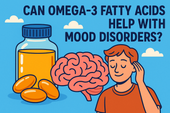
Can Omega-3 Fatty Acids Help with Mood Disorders?
Omega-3 fatty acids do more than support heart health — they can help balance mood, reduce depression, and calm anxiety. Discover how EPA and DHA nourish your brain, fight inflammation, and support emotional well-being from within. 🌊🧠
-

Vitamin D and Mood: The Sunshine Vitamin for Emotional Balance
Could the key to emotional balance be as simple as a little sunlight? Discover how vitamin D — the sunshine vitamin — influences serotonin, reduces inflammation, and helps you feel more positive and resilient year-round. ☀️💛
-

The Role of Magnesium in Reducing Irritability and Low Mood
Feeling on edge or emotionally drained? Magnesium could be the missing link between your body and your mood. Discover how this essential mineral reduces irritability, balances neurotransmitters, and helps your nervous system find calm again. 🌿✨
-
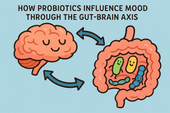
How Probiotics Influence Mood Through the Gut-Brain Axis
Discover how probiotics can do more than support your digestion—they can actually uplift your mood. This article explores the fascinating gut-brain axis and how balancing your gut bacteria through probiotics may help reduce anxiety, improve emotional stability, and support long-term mental well-being. 🌿🧠
-
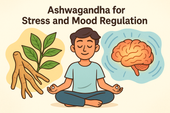
Ashwagandha for Stress and Mood Regulation
Discover how Ashwagandha, the powerful adaptogenic herb 🌿, helps your body manage stress and regulate mood. Learn how it balances cortisol, boosts GABA and serotonin, and supports emotional stability — helping you feel calm, focused, and resilient every day.
-
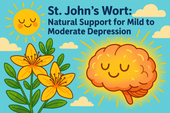
St. John’s Wort: Natural Support for Mild to Moderate Depression
Discover how St. John’s Wort, the “sunshine herb” 🌼, naturally supports mild to moderate depression. Learn how it boosts serotonin, balances mood, and promotes emotional resilience — with research showing its effectiveness compares to antidepressants, but with fewer side effects.
-
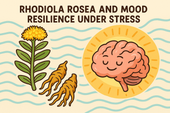
Rhodiola Rosea and Mood Resilience Under Stress
Discover how Rhodiola rosea helps your body adapt to stress 🌿. Learn how this powerful adaptogen balances cortisol, supports serotonin and dopamine, and strengthens emotional resilience — helping you stay calm, focused, and energized under pressure.
-

Chamomile and Lavender: Herbal Calm for Emotional Fluctuations
Discover how chamomile and lavender bring calm to emotional ups and downs 🌿. Learn how these two soothing herbs balance your nervous system, ease anxiety, and support restful sleep — naturally helping you find peace and emotional stability.
-
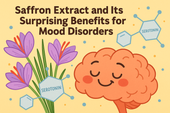
Saffron Extract and Its Surprising Benefits for Mood Disorders
Discover how saffron extract — the golden spice of joy 🌸 — can naturally support mood balance, ease anxiety, and lift mild depression. Learn what science says about its serotonin-boosting power, the ideal dosage, and how this ancient remedy compares to modern antidepressants.
-
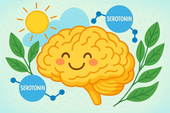
5-HTP and Serotonin: A Natural Path to Lifting Mood
Discover how 5-HTP naturally boosts serotonin 🌞 — the neurotransmitter behind mood, sleep, and emotional balance. Learn how this plant-derived compound supports happiness, reduces anxiety, and improves rest by helping your brain create more serotonin the gentle, natural way.
-
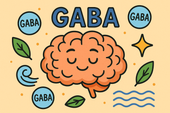
GABA Supplements for Reducing Anxiety and Mood Swings
Discover how GABA supplements can help reduce anxiety and balance mood naturally 🌿. Learn how this calming neurotransmitter works to quiet the mind, ease stress, and improve sleep — plus which nutrients and habits can boost your body’s own GABA production for long-term emotional stability.
-
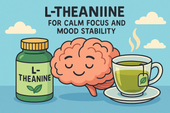
L-Theanine for Calm Focus and Mood Stability
Discover how L-theanine, the calming compound found in green tea 🍵, promotes focus, relaxation, and mood stability. Learn the science behind how it balances neurotransmitters, reduces stress hormones, and enhances clarity — helping you stay centered, calm, and productive without sedation.
-
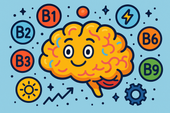
B Vitamins and Brain Chemistry: Supporting Energy and Emotional Balance
Discover how B vitamins power your brain chemistry ⚡. Learn how B6, B9, and B12 support serotonin, dopamine, and energy production — helping boost focus, mood, and emotional balance. From diet to supplements, explore how this vital nutrient group keeps your mind resilient and your energy steady.
-

N-Acetyl Cysteine (NAC) and Mood Disorders: What the Research Says
Learn how N-Acetyl Cysteine (NAC) supports brain health and mood balance 🧠. Discover how this antioxidant helps reduce oxidative stress, regulate glutamate, and improve emotional stability in depression, bipolar disorder, and anxiety — backed by cutting-edge psychiatric research.
-

Supplements for Bipolar Disorder: What May Support Stability
Discover the best supplements for bipolar disorder 🌿 that may support emotional stability and brain health. Learn how nutrients like omega-3s, magnesium, vitamin D, and NAC can help reduce inflammation, balance neurotransmitters, and complement traditional treatment safely.


















































